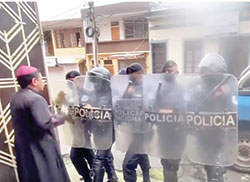Nicaraguan Catholic in Indianapolis shares story of generations of suffering
(En español)

Bishop Rolando Álvarez of Matagalpa, Nicaragua, is pictured in a screenshot from video at his residence in Matagalpa as riot police block the door. The police kept him and a group of priests, seminarians and lay Catholics under house arrest for about two weeks until Aug. 19 when the police seized them in a pre-dawn raid and took them in custody to Managua. (CNS screenshot/YouTube)
(Editor’s note: The woman interviewed for this article immigrated to the U.S. to escape the growing repression in her home country of Nicaragua. Because her son was killed there by members of a government-affiliated paramilitary unit and she still has a child there, her identity is being protected. She will be referred to in this article as Lucia.)
By Sean Gallagher
Lucia has known turmoil and unrest in her home country of Nicaragua from the time she was a toddler in the late 1970’s when Daniel Ortega and the Sandinista party came to power there.
Her family was opposed to them, and three of her older brothers died as a result.
“My family suffered at their hands,” said Lucia, who moved to Indianapolis from Nicaragua in July, in an interview with The Criterion.
The initial rule of Ortega, whom Lucia called a “bandido,” came to an end in 1990, but he was re-elected as president in 2006 and has ruled ever since. The legitimacy of the elections that have kept him in office have been increasingly questioned by international observers.
(Related story: Faith leads Nicaraguan family to leave all behind for a new life in the United States)
Nearly 40 years after Lucia’s family was scarred forever by Ortega’s government, its violence touched her again—this time through her then-young adult son.
In the spring of 2018, students across Nicaragua took to the streets to protest against government corruption and political repression. Hundreds of students died in the violent suppression of the protests.
At the time, Lucia’s son was assisting an uncle who ran a radio program that was opposed to the Ortega regime.
Members of a government-affiliated paramilitary unit tracked the uncle and Lucia’s son. The uncle escaped, but Lucia’s son did not. He was shot and killed in the streets.
“My son didn’t provoke anything. It’s really hard and really difficult,” said Lucia through tears. “God is the one who strengthens us in times of anguish.”
She is concerned for her daughter who still lives in Nicaragua with her husband and children.
Lucia is also saddened by the suffering the Church in Nicaragua is undergoing.
In recent months, the apostolic nuncio and members of the Missionaries of Charity have been expelled from the country, priests have been arrested, Catholic radio stations have been shut down and outdoor religious processions have been banned.
In early August, members of the national police in riot gear surrounded the home of Bishop Rolando Álvarez of Matagalpa, Nicaragua, after the government had accused him of fomenting violent opposition to the Ortega regime.
On Aug. 19, police officers in a pre-dawn raid seized Bishop Álvarez and the priests, seminarians and lay Catholics living with him and took them to Managua, Nicaragua’s capital.
Bishop Álvarez has been kept there under house arrest while the others seized with him were sent to Chipote Prison, notorious as a place where political prisoners have been tortured.
“The hardness of hearts of those in government is why they are doing this [to Bishop Álvarez],” said Lucia.
She especially wanted to speak up for the suffering priests of Nicaragua.
“They’re coming after priests, who are instruments of God,” Lucia said. “They’re doing nothing. I need to tell their story.”
Despite the suffering that Lucia, her family and the Church in Nicaragua have experienced, she has remained close to Christ.
“He helps heal our hearts, and he gives us forgiving hearts,” Lucia said, noting that she has forgiven the men who killed her son.
“I would love to return to Nicaragua to be with my family,” she said. “I am on the path right now that God has me on. The persecution there is so bad, and I am concerned about my family still there. I am afraid for them.”
Lucia said that Catholics in the archdiocese and beyond need to learn about what’s happening in Nicaragua and take it to God in prayer.
“There is so much that the people in Nicaragua need,” she said. “Of course, prayers are the most important thing. Pray that the enemy is not able to put hate in more people’s hearts, that they stop causing damage, because they are causing tremendous damage to humanity there.” †
